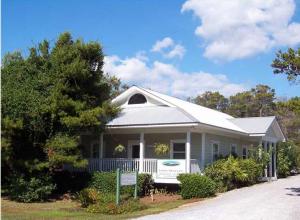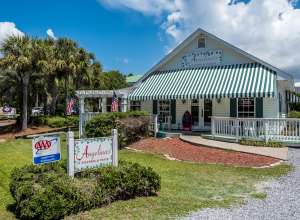Story
Smooth Jazz Provides Good Vibe For Listeners
October 28, 2010 by Joyce Owen
Oct. 18, 1994 was the “birth” date of WSBZ, The Seabreeze smooth jazz radio station. Looking forward to a continued bright future, owners Mark and Renee Carter delight in providing music not only to local listeners, but with the help of Internet streaming, to fans of smooth jazz around the world.

But it wasn’t always a breeze; in fact it wasn’t always Seabreeze. The first radio station they owned was WWAV 102. It was 1985 and they played soft vocals with a few jazz songs.
Most of SoWal was still under-developed, but the Carter’s saw potential along the nearly deserted stretch that would become Scenic 30A.
“People thought we were crazy. We were set up at the end of a road,” Mark says.
Although they sold the station in 1990, it was not long before Mark was searching for another opportunity to provide music to listeners. In 1994, he learned 106.3 FM was available. This time the format would be smooth jazz all the time.
WSBZ – Seabreeze – was born.
Teresa Baum-Farrow owner of “grow” marketing and advertising remembers those early days.
“I first met the Carter’s through Lisa (Ryan) Burwell in 1995 when Greg Barnhill and I moved to Seagrove. Lisa was helping us do marketing for the original Seacoast Pro-Songwriters Series and Mark and Renee were generous with radio promotions for the songwriter events we held at the Lyceum in Seaside,” she recalls. “There were probably about 100 of us who were permanent residents on 30A in that time period. We were all pioneers in our own right. It was informal, crazy and fun."
“Mark and Renee operated the station out of their small brick ranch house in Point Washington. Things were simpler then and Mark’s station was really the only game in town catering to the adult contemporary market. Clients just dropped by with their ideas for radio commercials or jingles. They were recorded right there in the home studio,” she says.
Mark still uses local advertising and emphasizes there are no screaming ads to disrupt the smooth jazz format. It’s all about maintaining a soothing experience, he says. Smooth jazz is a lifestyle – the vibe, the flow of the music – that let’s people relax. People need that outlet to unwind.
While Seabreeze has flourished, stations with a similar format have gone off the air. Out of 10,000 radio stations in the United States, there are only 23 that play smooth jazz exclusively. A caller from Atlanta advised Mark that listeners along the Emerald Coast should be thankful for Seabreeze as the jazz stations in Atlanta no longer existed.
It’s a theme that is repeated by visitors to the station’s Facebook page. New York City, D.C. and Boston no longer have stations that are devoted to jazz. Mark notes the majority of the jazz-only stations are located west of the Mississippi.
This brings WSBZ to the attention of musicians looking for an audience. Mark gets about 50 CD’s a week and encourages submittals from new performers. It’s not only that he plays jazz; he is also a reporting station to Billboard, an organization that monitors and tracks current songs being played. Mark documents how many spins each song gets each week, which in turn impacts the rankings and can help to make the song a hit.
But it’s not only the radio station that gets attention from musicians. Mark always knew that SoWal was the place for artists and musicians and wanted to bring jazz musicians to South Walton. The decision to host a jazz festival didn’t start out as a way to bring people in, but to provide entertainment for locals.
Since 2004, Hilltop Productions has been involved with the Seabreeze Jazz Festival, says owner Chuck Hinson who provides vendors, management, security and infrastructure design to the events.
”Each year, I have seen the jazz festival grow from a small crowd of 1,000 for the entire weekend, to upwards of 20,000 for a sold-out weekend,” Chuck says.
Over the years, the Festival has been held in Seaside, WaterColor, Gulf Place and Seascape, but in 2009, having outgrown all those venues, it was time to find a new site.
“When we left Gulf Place, we asked where could we go and stay in Walton County?” Mark says.
The DeFuniak Springs fairgrounds were suggested, but the question of accommodations for 10,000 guests quickly ended any consideration of that option. As the couple searched Santa Rosa Beach and its environs, it was important to stay within our coverage area, Mark says.
Walton County needs an outdoor amphitheater for art festivals, concerts, and even high school graduations, Mark says. For the jazz festival, which can bring in thousands of guests for a weekend, the site must be not only a place for the concert, there needs to be hotels, shopping, dining opportunities.
 “We never expected to go to Panama City Beach,” he says, but two years ago, they set up next to Pier Park.
“We never expected to go to Panama City Beach,” he says, but two years ago, they set up next to Pier Park.
The economic impact of the jazz festival is substantial. In 2006, the University of West Florida’s HAAS Center estimated $1.6 million was generated by visitors attending the three-day event.
Another impact, the contribution the station has made in the schools, is often overlooked. Jazz musicians donate time to visit local schools to offer instruction and encouragement for young musicians to continue playing. Funding from the festivals has purchased guitars for Butler Elementary School, founded a steel pan band at South Walton High School and provided scholarships to music students to continue their training in college.
After the disastrous oil spill this spring, that actually occurred the weekend of the jazz festival, many in the tourism industry realized they couldn’t rely only on the beach, they had to seek other means to bring tourists to this area.
Noting the benefit several musical performances had on the economy, Mark hopes tourism officials will look at entertainment options – not just music festivals – but theatre presentations and cultural arts events, as opportunities to increase the number of heads in beds.


















